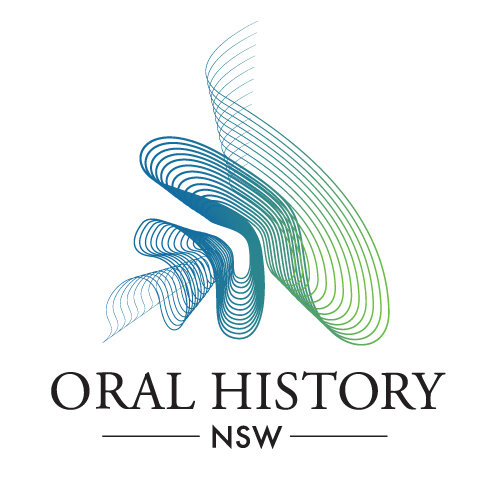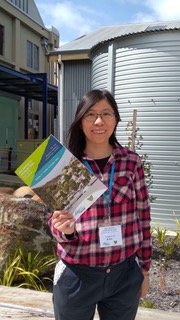Long Yin Ko was a recipient of the 2022 Oral History NSW Conference Grant awarded to two presenters attending the Biennial Oral History Australia Conference in person. She reflects on her oral history work and presenting and attending the Conference held in Launceston.
When I moved to Australia three years ago, it never occurred to me that I would be practising oral histories in Cantonese. Growing up in Hong Kong, I received anthropological training, and interviews in my native tongue were the bread and butter of my education; however, when I moved to an English-speaking country, I felt like I had forsaken all my advantages. Day after day, I began to wonder how those before me adapted to a new life here in Australia. My own skills in interviewing and attempts to find answers inspired a collaborative project. Unlike previous projects conducted in English, this oral history project would be in Cantonese.
Attending my first-ever conference! Photo courtesy Christopher Cheng.
Now, three years of recording oral histories have led to another privilege: attending my first-ever conference. The biennial conference, ‘Oral History in Troubling Times: Opportunities & Challenges’ in Launceston. This was a chance to rub shoulders with ‘giants’ in our field, whom I have long admired.
After our presentation, Ellen Forsyth notified us (Christopher and I) that she was one of the authors cited in our paper. Her important research ‘What if I speak Another Language’ (2021), with Oriana Acevedo, encouraged members of Australia’s culturally and linguistically diverse communities to work with libraries to expand their collections, and so she was glad that Christopher Cheng and I were doing just that by working closely with the State Library of New South Wales.
Kate Bagnall and Sophie Couchman, being familiar with the Chinese language, encouraged us to think about how we, as interviewers, are shaped by our own background as Cantonese-speaking Chinese Australians. In hindsight, I think interviews could only take place because they were done in Cantonese. In other words, oral histories in community languages allow non-English speakers (whose English may not be their first or best language) an opportunity to have their stories told. Beyond that, even though I was often the same generation as the narrator’s children, I could relate to my narrators on a level that their kids couldn’t. My narrators commented that it was easier to talk to me since their kids were often less articulate in their mother tongue. Also, I was able to better understand our culture and history and, more importantly, what it was like to be a newcomer in Australia.
Personally, doing oral histories have immensely helped me to adjust to life in Australia. Positive feedback from fellow conference participants has also greatly encouraged us to continue. We hope that more Cantonese or other non-English sound recordings will be made allowing future generations of non-English speakers to benefit from the wisdom and experience of those who have come before us.
In fact, as Christopher and I were getting ready to leave our dinner table after the presentation, we were surprised to run into a fellow conference attendee. Having heard our session, we were told how she is now more motivated than ever to begin a project with migrants from a country where she had spent time abroad. Certainly, it was very satisfying to hear that oral history projects in languages other than English were being considered just hours after our presentation. This was not something we could have anticipated when we first submitted our conference abstract.

